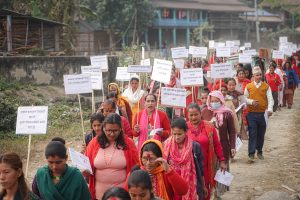

Your browser is not up to date.
If you wish to view the Action Against Hunger website correctly, update your browser.
Find the latest versions of supported browsers listed below.
No matching results…
No results seem to match what you are looking for, please modify your search.
 © Kishor Sharma pour Action contre la Faim
© Kishor Sharma pour Action contre la Faim
Headline
Nepal has a spectacular natural beauty, with landscapes ranging from snow-capped Himalayan peaks to verdant valleys and tumultuous rivers. The majestic peaks, including Everest, attract mountaineers worldwide, while the abundant forests are home to remarkable biodiversity.
Nevertheless, behind this striking image lies another reality marked by socio-economic challenges, notably poverty, structural unemployment, and vulnerability to climate change.
Due to its geographical location between India and China, Nepal largely depends on these two countries for trade and commerce. Poverty and structural unemployment persist, with 20% of the population living below the poverty line. Access to healthcare, drinking water, and adequate sanitation remains a major challenge for many rural communities. Unemployment remains a constant problem due to a weak industrial sector and limited job opportunities.
As a result, many families struggle to meet their daily needs and face constant financial hardship. Solutions such as developing sustainable agriculture, investing in local infrastructure, promoting entrepreneurship, and improving access to education and vocational training are crucial to strengthening their livelihoods. These initiatives can help diversify income sources, create local jobs, and improve the living conditions of vulnerable communities. Action Against Hunger carries out projects to empower women by strengthening their role in local economic activities. Our teams also work to create additional sources of income for communities by developing sustainable income-generating activities.
These projects also aim to respond to climatic challenges, such as frequent flooding, by promoting drought-resistant crops and implementing agricultural techniques adapted to changing environmental conditions. These integrated approaches aim to improve food security and the livelihoods of populations that depend primarily on agriculture.


Considered one of the countries most vulnerable to climate change, Nepal is hit by climatic events almost yearly. A magnitude 6.4 earthquake, for example, hit the province of Karnali in November 2023, displacing over 40,000 people. In August 2017, the Terai region experienced incessant rainfall, causing the flooding of around 80% of the land. In 2015, a devastating earthquake took the lives of 9,000 people and left millions more homeless. In the districts of Nuwakot and Rasuwa, just a few hours from the capital, Action Against Hunger teams have been working since April 2015 to rehabilitate water networks damaged by the earthquake. This involves installing individual water taps in the courtyards of houses and building water tanks in the villages. This project will improve the living conditions of 30,000 local residents and ensure the availability of water in the event of drought or extreme climatic events. In addition to solutions for adapting to climate change, numerous health projects were implemented during this period with the aim of reducing malnutrition rates across the country.
Although Nepal has made enormous progress in rebuilding essential infrastructure, more investment is needed to strengthen the country’s ability to cope with these events.


Nepal faces a major waste management problem, with challenges related to solid waste collection, treatment, and disposal. In addition to poor waste treatment practices, the prevalence of plastic packaging is an endemic problem, with many individually packaged products being thrown directly into the environment. “Plastic waste pollution is one of the biggest problems in these regions. To cut costs, all products are systematically sealed in small sachets, like shampoo. Once used, the sachet is thrown on the ground. Obviously, this creates a monumental amount of plastic that is not biodegradable“, explains Julien Eyrard, technical advisor for water, sanitation, and hygiene at Action Against Hunger. Tourist destinations also suffer the negative impact of plastic waste, where local inhabitants are overwhelmed by the situation.
To counter this phenomenon, our teams regularly organize clean-up days with the inhabitants of the village of Gatlang, a popular destination for thousands of Nepalese tourists. The idea is to make it a model village in terms of environmental hygiene, to raise awareness among locals and tourists alike, and to popularize the approach throughout the region. In the future, ACF plans to work closely with schools and municipalities to develop programs to raise awareness of ecology and environmental protection among future generations.
Nepal
All the news of our Action: articles, events, testimonials, press releases…